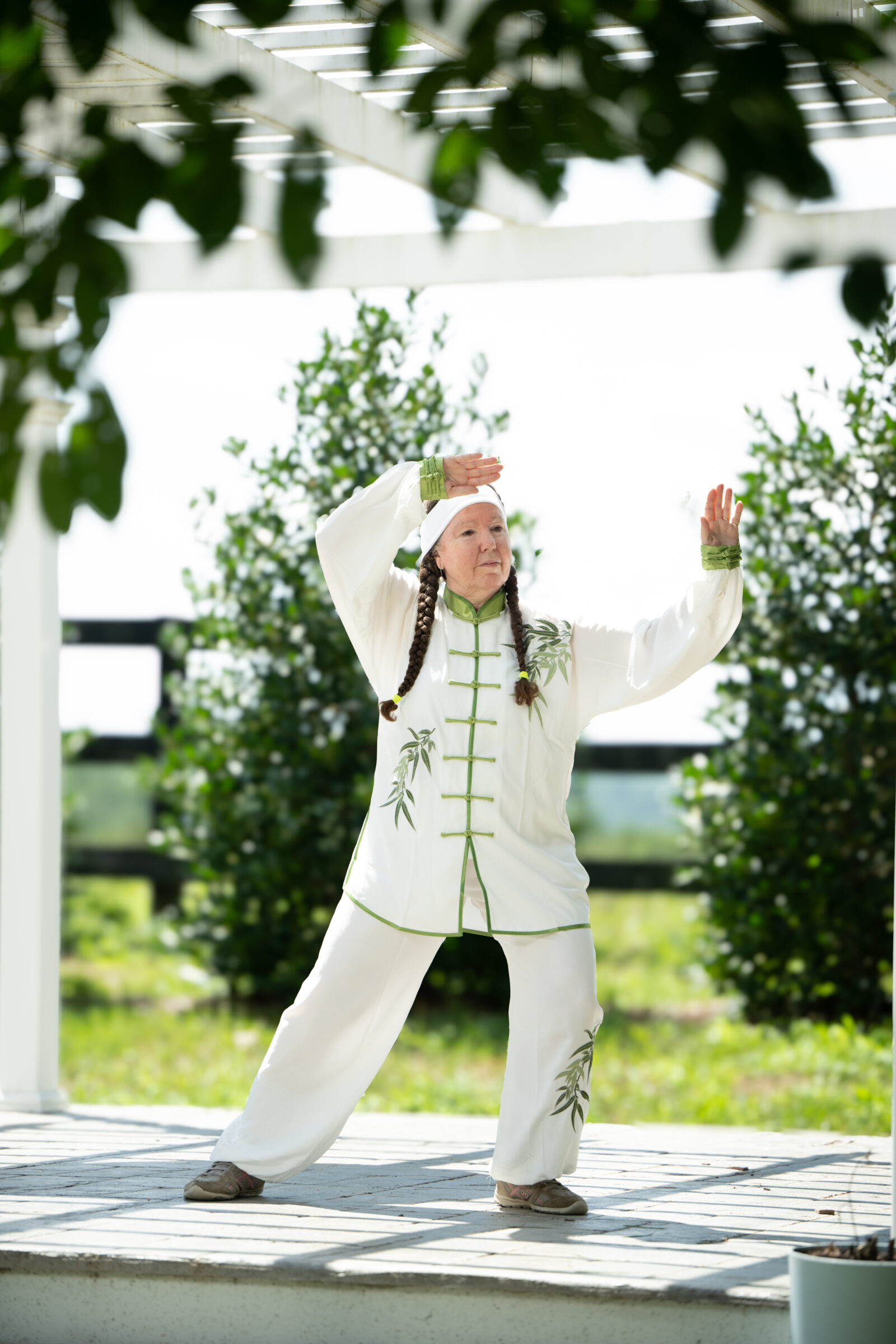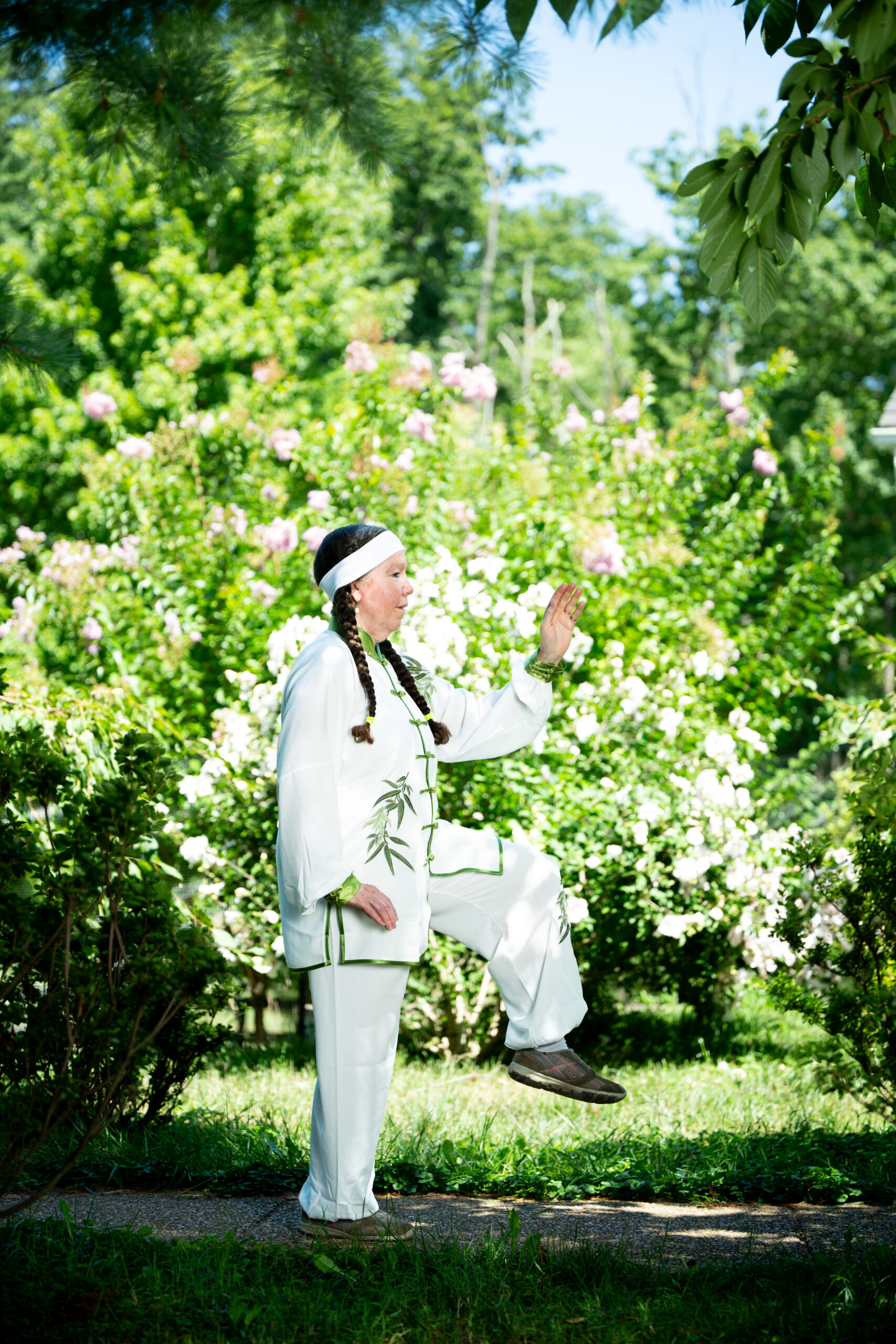Misia Broadhead and the Art of Tai Chi

Written by Dulcy B. Hooper | Photos by Michael Butcher
Misia Broadhead is most known in the Middleburg community for her dedication to art and her talent as an artist. Along with her husband, Anthony Barham, she works out of Broadhead-Barham Studios in The Plains, creating paintings that have been acquired by collectors and used generously in auctions to benefit any number of local nonprofits.
However, Broadhead has another long-term passion: tai chi, an ancient art that has been around for over 2,000 years and is described as a mind-body practice combining gentle, flowing movements with meditation and deep breathing.
According to Broadhead, tai chi incorporates principles of Taoism, focusing on the balance of yin and yang. “There are various forms of tai chi developed over many generations,” she explains. “Although they have unique characteristics, the basic principles unite them.”
Broadhead has trained in tai chi for over 20 years with local master Bob Gardner, who has dedicated 40 years to the practice and training of martial arts.
“I learned all of the forms from him,” she says. “The focus of my training has been the Beijing-style short-form posture, the Beijing-style long-form posture, the sword form, the saber form, and the staff form.” Broadhead notes that each form comprises a sequence of specific movements done in a slow, methodical manner. “The process releases the stresses that accumulate in our bodies,” she adds. “In doing so, your mind becomes peaceful as you live in the moment.”
After seven years of twice-weekly classes with Gardner and dedicated practice in between, she asked Gardner if she was ready to teach.
“He gave it his blessing,” Broadhead says, “and that’s when I began teaching tai chi myself.” She now teaches at the Middleburg Community Center, with three classes each on Mondays and Wednesdays. She believes the experience of teaching others has helped her further develop her own skills.
While tai chi is practiced today primarily for its health benefits and meditative qualities, its roots and techniques originate in the realm of martial arts, where it was practiced by monks and warriors to maintain fitness and protect against intruders.

“The aim is to balance the body’s vital energy (qi) and improve mental and physical health,” Broadhead shares. “It originated in China and is based on qi, the energy that permeates and circulates throughout the body and gives it life and health.” According to Broadhead, healthy qi is always moving and circulating “through the head and vital organs, into the extremities and then back again.”
The slow and methodical movements of tai chi provide a way to become more mindful and aware. “The movements gain fluidity as the body relaxes, releasing stress and anxiety. Thus, the ‘monkey brain’ slows down and becomes more peaceful.”
About a year ago, Broadhead began teaching tai chi to her husband. “Of course, he picked it up right away,” she beams. “Bob Gardner was actually his aikido teacher for many years.” Broadhead further explains that “aikido is a nonviolent Japanese martial art that holds the same principles as tai chi.” Barham says that he does “tai chi ‘snacks’ all day,” and describes it as “self-defense against the sofa,” praising the techniques for how timeless and effective they are.
Those who practice report that tai chi leads to noticeable improvements in balance, flexibility, and overall well-being and has the potential to offer numerous improvements to mental and physical health. Recent studies have reported improved cardiovascular health through tai chi and found it to be more effective at reducing blood pressure than vigorous forms of exercise, such as aerobic activities. Other studies suggest that tai chi can boost the immune system, alleviate chronic pain conditions, improve muscle strength and endurance, and reduce the risk of falls, especially in older adults.
“There is so much I could say about the profound benefits this discipline provides,” Broadhead concludes. “It is very good for balance, and very good as a stress and anxiety reliever. In fact, the more relaxed you become, the more that qi develops throughout your body.” ML
For more information on beginner, advanced, and private classes, Misia Broadhead can be reached at [email protected] or by phone at (571) 206-7501.
Published in the September 2024 issue of Middleburg Life.








